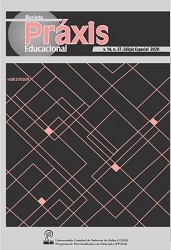KANT AND ANTHROPOLOGICAL DIDACTICS
DOI:
https://doi.org/10.22481/praxisedu.v16i37.6449Keywords:
Kant, Didactics, AnthropologyAbstract
Kant defines anthropology as a systematic doctrine that contains our knowledge of man and suggests that this knowledge can be given a physiological or pragmatic perspective. The first involves knowledge of the things of the world, or man as an object of and in nature; the second encompasses man's knowledge as an active, free being, as a citizen of the world. Kantian anthropology adheres to the pragmatic perspective and divides its material according to an anthropological didactic and an anthropological characterization. The work seeks to focus on the exemplification of anthropological didactics based on the Kantian approach to the topic of prudence (a certain art of living together in civilization), trying to demonstrate that at this point we find a philosophical anthropology associated with a markedly pedagogical process.
Downloads
Metrics
References
CASTILLO, M. Introduction à l’anthropologie kantienne. Paris : École des Hautes Etudes en Sciences Sociales, 1996.
CASTILLO, M. Kant et l’avenir de la culture. Paris: Puf, 1990.
DESCARTES. Descartes à P. Mesland, 2 mai 1644. In Oeuvres de Descartes (Tome IV). Publiées par C. Adam & P. Tannery. Paris: Vrin, 1996.
DICTIONNAIRE ETYMOLOGIQUE. Paris : Centre National des Ressources Textuelles et Lexicales, 2012.
FOUCAULT, M. Introduction à l’Anthropologie. Paris : Vrin, 2008.
KANT, I. Antropologia de um ponto de vista pragmático. Trad. de Clélia A. Martins. São Paulo: Iluminuras, 2006.
KANT, I. Kant’s gesammelte Schriften. Herausgegeben von der Königlich Preussischen Akademie der Wissenschaften. Berlin, 1900.
- Kritik der reinen Vernunft (KrV)
- Metaphysik der Sitten (Metaphysik)
- Grundlegung zur Metaphysik der Sitten (Grundlegung)
- Beantwortung auf die Frage: Was ist Aufklärung? ( Was ist Aufklärung)
- Über Pädagogik (Über Pädagogik )
- Kritik der Urteilskraft (KU)
- Logik (Logik)
- Reflexionen (Reflexionen.)
MARROU, H-I. Histoire de l’éducation dans l’Antiquité. Paris : Seuil, 1948.
MENEZES, E. História e esperança em Kant. São Cristóvão/Aracaju: Editora da Universidade Federal de Sergipe/Fundação Oviêdo Texeira, 2000.
RUFFING, R. L’homme comme expression de l’inconditionné dans la natur. Trans/Form/Ação, São Paulo, 32(1): 37-53, 2009.
STARKE, Fr. Ch. (Hrsg.). Immanuel Kants Menschenkunde / nach handschriftl. Vorlesungen hrsg. von Fr. Ch. Starke ; im Anh., Immanuel Kants Anweisung zur Menschen- und Weltkenntnis, nach dessen Vorlesungen im Winterhalbjahr 1790-1791 hrsg. von Fr. Ch. Starke ; mit e. Vorbemerkung von Giorgio Tonelli. Hildesheim: Olms Verlag, 1976.
VANDEWALLE, B. Kant. Educación y crítica. Trad. de Horacio Pons. Buenos Aires: Nueva Visión, 2004.
VERGNAUD, G. Rapport Carraz. In: CARRAZ, R. Recherche en éducation et développement de l'enfant (Rapport au ministre de l'Industrie et de la Recherche). Paris: La Documentation française, 1983.
Downloads
Published
How to Cite
Issue
Section
License
You are free to:
Share - copy and redistribute the material in any medium or format; Adapt - remix, transform, and build from the material for any purpose, even commercially. This license is acceptable for Free Cultural Works. The licensor cannot revoke these freedoms as long as you follow the terms of the license.
Under the following terms:
Attribution - You must appropriately give credit, provide a link to the license, and indicate if any changes have been made. You may do so in any reasonable way, but not in a way that suggests that you or your use is endorsed by the licensor.
There are no additional restrictions - You cannot apply legal terms or technological measures that legally restrict others to make any use permitted by the license.










